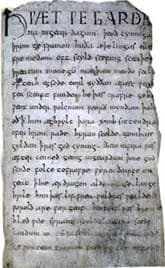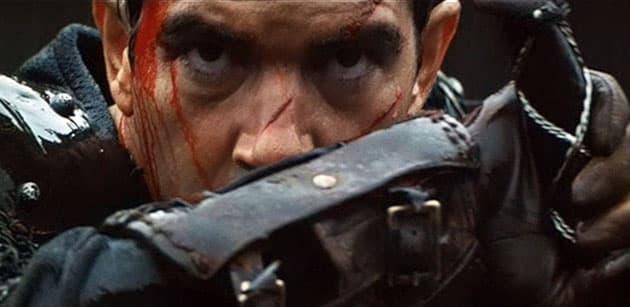Beowulf
Critique • Quotes • Text • Translations • At the movies
 Earliest known manuscript
Earliest known manuscriptFirst publication
c. 700
Literary form
Poem
Genres
Literary, epic, mythology, adventure
Writing language
Old English
Author's country
Unknown
Length
Approx. 30,000 words

Antonio Banderas is a poet caught in events that led to the writing ofBuliwyf—that is, Beowulf.
Beowulf through foreign eyes
The 13th Warrior (1999): Film, 103 minutes; director John McTiernan; writer William Wisher Jr.; featuring Antonio Banderas, Diane Venora, Omar Sharif
In the same year as we received the first Beowulf adaptation, we get The 13th Warrior, which is also said to be a version of the story. It's a much better film, though it has more to do with the origins of the epic tale than with the details of the Anglo-Saxon story.
This big-budget movie is actually based on a Michael Crichton 1976 novel, Eaters of the Dead, which in turn is supposed to be a retelling of Beowulf. Antonio Banderas is a nomadic Arabic poet who is banished from homeland for sleeping with another man's wife. He joins a party of Norsemen who come to the rescue of a village under siege by demons.
It's more like a Dark Ages remake of The Magnificent Seven or The Seven Samurai really. Except, I guess, there are thirteen of them.
However, the film was intended to be, more than this. Apparently The 13th Warrior was filmed as an epic, one of the most expensive films of its time. But it was mercilessly cut down by the studio into the action/horror flick we see on our screens today—and has the reputation of being one of the biggest bombs of its time.
This is too bad, as the film shows great promise. Good acting. Great production values with realistic effects. Historical and geographical accuracy. An A-film, all around.
The kingdom of King Hrothgar (Sven Wolltar) is beset by seemingly supernatural, flesh-eating creatures, as in the Beowulf tale. And the Norse warriors who sacrifice themselves to defeat the fiends are led by a Viking prince whose name is given as Buliwyf (an Arabic take on "Beowulf"?). The fiends, by the way, turn out to be less than supernatural, more like savage human.
The poet played by Banderas is there mainly as an observer and chronicler of the events. But he learns he cannot stand aside and becomes a man himself in the struggle.
Preparing for the final battle in The 13th Warrior, a reworking of the Beowulf myth.
For the fan of Beowulf, the fascinating differences and similarities between the epic story and the movie raise the question of whether this is a speculated origin of the story—historical events of the Viking era recorded by an outsider and fed back to the Anglo-Saxons of Britain with the inevitable revisions along the way.
Perhaps the director's cut of the film would give us more to go on. Or maybe not. We'll likely never know.
But as it is, The 13th Warrior is a flawed film that has grown in stature over the years. Especially for those who have read the epic and are interested in its mysterious origins.
— Eric
Critique • Quotes • Text • Translations • At the movies

